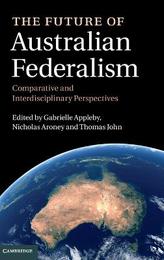
|
The Future of Australian Federalism: Comparative and Interdisciplinary Perspectives
Hardback
Main Details
| Title |
The Future of Australian Federalism: Comparative and Interdisciplinary Perspectives
|
| Authors and Contributors |
Edited by Gabrielle Appleby
|
|
Edited by Nicholas Aroney
|
|
Edited by Thomas John
|
| Physical Properties |
| Format:Hardback | | Pages:504 | | Dimensions(mm): Height 234,Width 158 |
|
| ISBN/Barcode |
9781107006379
|
| Classifications | Dewey:342.94042 |
|---|
| Audience | | Professional & Vocational | |
|---|
| Illustrations |
15 Tables, black and white; 9 Line drawings, unspecified
|
|
Publishing Details |
| Publisher |
Cambridge University Press
|
| Imprint |
Cambridge University Press
|
| Publication Date |
8 March 2012 |
| Publication Country |
United Kingdom
|
Description
At a time when the operation and reform of federal relations within Australia is squarely on the political agenda, this volume brings together eminent lawyers, economists and political scientists who explain, analyse and evaluate the theory and principles underpinning the Australian federal system. Topics covered include the High Court's approach to the interpretation of the Constitution and how this has influenced federal relations in practice; different forms of inter-governmental co-operative arrangements; fiscal relations between the Commonwealth and the States; and emergent ethno-cultural and socioeconomic diversity within the Australian Federation. Comparative perspectives from Germany, America, Canada, Switzerland, India and the European Union provide unique prisms through which to view the operation of the Australian system and to contemplate its reform.
Author Biography
Gabrielle Appleby is a PhD candidate at the University of Adelaide researching the constitutional role of the Solicitor-General in Australia. Nicholas Aroney is Professor of Constitutional Law at the Centre for Public, International and Comparative Law in the TC Beirne School of Law, University of Queensland. Thomas John heads the Commonwealth Attorney-General Department's private international law section.
Reviews'This diverse and wide-ranging collection brings together some of the best thinkers on federalism both locally and internationally, and enriches contemporary debates on the challenges and possibilities of Australian federal reform by placing them in engaging comparative perspective. It will be of interest to students, academics and public policy practitioners across law, political science and economics, and is highly recommended as a significant contribution to federal scholarship.' Paul Kildea, Commonwealth and Comparative Politics
|